36 Books Published by Free Press on AALBC — Book Cover Collage
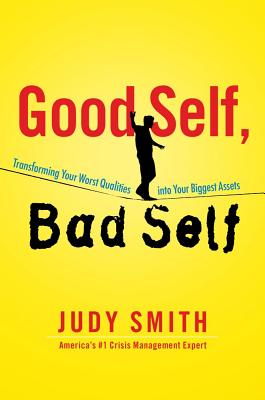 Good Self, Bad Self: Transforming Your Worst Qualities Into Your Biggest Assets
Good Self, Bad Self: Transforming Your Worst Qualities Into Your Biggest Assets
by Judy SmithFree Press (Apr 03, 2012)
Read Detailed Book Description
From the real-life crisis expert who inspired ABC’s Scandal.
Everyone must learn to live with personal missteps. Whether you’ve put yourself in an awkward situation, or you find that you’ve unwittingly created a full-blown crisis, Judy Smith is here to teach you how to look within to diffuse, mitigate, and resolve issues at their root.
Good Self, Bad Self will teach you how to face and overcome potential problems before they send your life spinning out of control. Using the straightforward and incredibly effective POWER model—which incorporates the same strategies Judy uses with her high-profile clients—you can learn to master and expertly handle any sticky situation in your own life. Smith distills years of experience, sharing tools we all need to face our mistakes and overcome them.
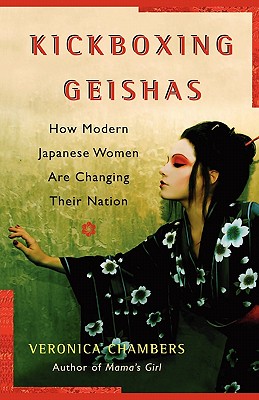 A Kickboxing Geishas: How Modern Japanese Women Are Changing Their Nation
A Kickboxing Geishas: How Modern Japanese Women Are Changing Their Nation
by Veronica ChambersFree Press (Dec 01, 2010)
Read Detailed Book Description
Forget the stereotypes. Today’s Japanese women are shattering them — breaking the bonds of tradition and dramatically transforming their culture. Shopping-crazed schoolgirls in Hello Kitty costumes and the Harajuku girls Gwen Stefani helped make so popular have grabbed the media’s attention. But as critically acclaimed author Veronica Chambers has discovered through years of returning to Japan and interviewing Japanese women, the more interesting story is that of the legions of everyday women — from the office suites to radio and TV studios to the worlds of art and fashion and on to the halls of government — who have kicked off a revolution in their country. Japanese men hardly know what has hit them. In a single generation, women in Japan have rewritten the rules in both the bedroom and the boardroom. Not a day goes by in Japan that a powerful woman doesn’t make the front page of the newspapers. In the face of still-fierce sexism, a new breed of women is breaking through the "rice paper ceiling" of Japan’s salary-man dominated corporate culture. The women are traveling the world — while the men stay at home — and returning with a cosmopolitan sophistication that is injecting an edgy, stylish internationalism into Japanese life. So many women are happily delaying marriage into their thirties — labeled "losing dogs" and yet loving their liberated lives — that the country’s birth rate is in crisis. With her keen eye for all facets of Japanese life, Veronica Chambers travels through the exciting world of Japan’s new modern women to introduce these "kickboxing geishas" and the stories of their lives: the wildly popular young hip-hop DJ; the TV chef who is also a government minister; the entrepreneur who founded a market research firm specializing in charting the tastes of the teenage girls driving the country’s GNC — "gross national cool"; and the Osaka assembly-woman who came out publicly as a lesbian — the
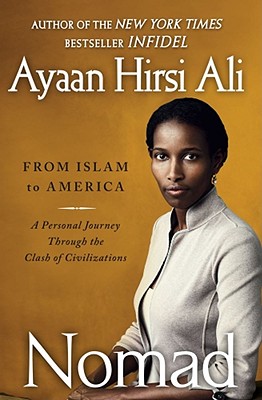 Nomad: From Islam to America: A Personal Journey Through the Clash of Civilizations
Nomad: From Islam to America: A Personal Journey Through the Clash of Civilizations
by Ayaan Hirsi AliFree Press (May 18, 2010)
Read Detailed Book Description
"This woman is a major hero of our time." —Richard Dawkins Ayaan Hirsi Ali captured the world’s attention with Infidel, her compelling coming-of-age memoir, which spent thirty-one weeks on the New York Times bestseller list. Now, in Nomad, Hirsi Ali tells of coming to America to build a new life, an ocean away from the death threats made to her by European Islamists, the strife she witnessed, and the inner conflict she suffered. It is the story of her physical journey to freedom and, more crucially, her emotional journey to freedom—her transition from a tribal mind-set that restricts women’s every thought and action to a life as a free and equal citizen in an open society. Through stories of the challenges she has faced, she shows the difficulty of reconciling the contradictions of Islam with Western values. In these pages Hirsi Ali recounts the many turns her life took after she broke with her family, and how she struggled to throw off restrictive superstitions and misconceptions that initially hobbled her ability to assimilate into Western society. She writes movingly of her reconciliation, on his deathbed, with her devout father, who had disowned her when she renounced Islam after 9/11, as well as with her mother and cousins in Somalia and in Europe. Nomad is a portrait of a family torn apart by the clash of civilizations. But it is also a touching, uplifting, and often funny account of one woman’s discovery of today’s America. While Hirsi Ali loves much of what she encounters, she fears we are repeating the European mistake of underestimating radical Islam. She calls on key institutions of the West—including universities, the feminist movement, and the Christian churches—to enact specific, innovative remedies that would help other Muslim immigrants to overcome the challenges she has experienced and to resist the fatal allure of fundamentalism and terrorism. This is Hirsi Ali’s intellectual coming-of-age, a memoir that conveys her philosophy as well as her experiences, and that also conveys an urgent message and mission—to inform the West of the extent of the threat from Islam, both from outside and from within our open societies. A celebration of free speech and democracy, Nomad is an important contribution to the history of ideas, but above all a rousing call to action.
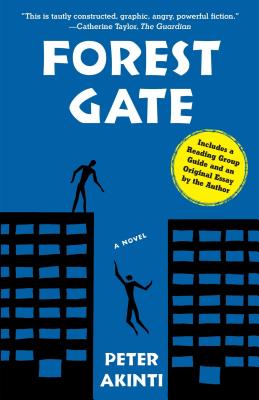 Forest Gate: A Novel
Forest Gate: A Novel
by Peter AkintiFree Press (Feb 02, 2010)
Read Detailed Book Description
In a community where poverty is kept close and passed from one generation to the next, two teenage boys, best friends Ashvin and James, stand on top of twin tower blocks. Facing each other across the abyss of London’s urban sprawl, they say their goodbyes in the final stages of a suicide pact. The boys jump together, each with a rope around his neck. Only Ashvin dies. James awakes in hospital, struggling with guilt and faced with his dysfunctional family, a well-meaning psychologist and, eventually, Ashvin’s grieving sister Armeina. Forest Gate is narrated by Armeina, a young refugee from Somalia who, with the death of her brother, suffers the loss of her entire family. As she tells the story of her brother’s life and seeks to understand why he would kill himself, she finds herself drawn to James. Seeking comfort from each other, and desperate to rebuild their lives, James and Armeina form a special bond and together set out to find a place they can both call home. Set in London, Somalia and Brazil, Peter Akinti’s debut is a beautifully wrought, profoundly affecting and sometimes violent novel rich in the true history of our time. Armeina and James’s journey towards life through their past is, ultimately, a powerful story of redemptive love.
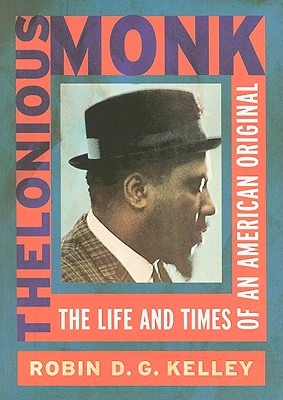 Thelonious Monk: The Life And Times Of An American Original
Thelonious Monk: The Life And Times Of An American Original
by Robin D. G. KelleyFree Press (Oct 06, 2009)
Read Detailed Book Description
THELONIOUS MONK is the critically acclaimed, gripping saga of an artist’s struggle to “make it” without compromising his musical vision. It is a story that, like its subject, reflects the tidal ebbs and flows of American history in the twentieth century. To his fans, he was the ultimate hipster; to his detractors, he was temperamental, eccentric, taciturn, or childlike. His angular melodies and dissonant harmonies shook the jazz world to its foundations, ushering in the birth of “bebop” and establishing Monk as one of America’s greatest com≠posers. Elegantly written and rich with humor and pathos, Thelonious Monk is the definitive work on modern jazz’s most original composer.
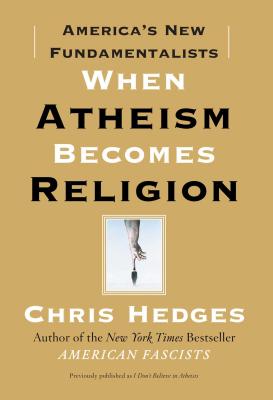 When Atheism Becomes Religion: America’s New Fundamentalists
When Atheism Becomes Religion: America’s New Fundamentalists
by Chris HedgesFree Press (Mar 10, 2009)
Read Detailed Book Description
From the New York Times bestselling author of American Fascists and the NBCC finalist for War Is a Force That Gives Us Meaning comes this timely and compelling work about new atheists: those who attack religion to advance the worst of global capitalism, intolerance and imperial projects.
Chris Hedges, who graduated from seminary at Harvard Divinity School, has long been a courageous voice in a world where there are too few. He observes that there are two radical, polarized and dangerous sides to the debate on faith and religion in America: the fundamentalists who see religious faith as their prerogative, and the new atheists who brand all religious belief as irrational and dangerous. Both sides use faith to promote a radical agenda, while the religious majority, those with a commitment to tolerance and compassion as well as to their faith, are caught in the middle.
The new atheists, led by Richard Dawkins, Christopher Hitchens and Sam Harris, do not make moral arguments about religion. Rather, they have created a new form of fundamentalism that attempts to permeate society with ideas about our own moral superiority and the omnipotence of human reason.
I Don’t Believe in Atheists critiques the radical mindset that rages against religion and faith. Hedges identifies the pillars of the new atheist belief system, revealing that the stringent rules and rigid traditions in place are as strict as those of any religious practice.
Hedges claims that those who have placed blind faith in the morally neutral disciplines of reason and science create idols in their own image — a sin for either side of the spectrum. He makes an impassioned, intelligent case against religious and secular fundamentalism, which seeks to divide the world into those worthy of moral and intellectual consideration and those who should be condemned, silenced and eradicated. Hedges shatters the new atheists’ assault against religion in America, and in doing so, makes way for new, moderate voices to join the debate. This is a book that must be read to understand the state of the battle about faith.
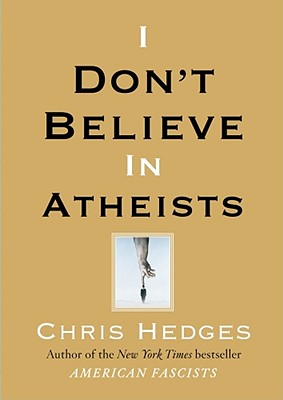 I Don’t Believe in Atheists
I Don’t Believe in Atheists
by Chris HedgesFree Press (Mar 04, 2008)
Read Detailed Book Description
From the New York Times bestselling author of American Fascists and the NBCC finalist for War Is a Force That Gives Us Meaning comes this timely and compelling work about new atheists: those who attack religion to advance the worst of global capitalism, intolerance and imperial projects.Chris Hedges, who graduated from seminary at Harvard Divinity School, has long been a courageous voice in a world where there are too few. He observes that there are two radical, polarized and dangerous sides to the debate on faith and religion in America: the fundamentalists who see religious faith as their prerogative, and the new atheists who brand all religious belief as irrational and dangerous. Both sides use faith to promote a radical agenda, while the religious majority, those with a commitment to tolerance and compassion as well as to their faith, are caught in the middle. The new atheists, led by Richard Dawkins, Christopher Hitchens and Sam Harris, do not make moral arguments about religion. Rather, they have created a new form of fundamentalism that attempts to permeate society with ideas about our own moral superiority and the omnipotence of human reason. I Don’t Believe in Atheists critiques the radical mindset that rages against religion and faith. Hedges identifies the pillars of the new atheist belief system, revealing that the stringent rules and rigid traditions in place are as strict as those of any religious practice. Hedges claims that those who have placed blind faith in the morally neutral disciplines of reason and science create idols in their own image — a sin for either side of the spectrum. He makes an impassioned, intelligent case against religious and secular fundamentalism, which seeks to divide the world into those worthy of moral and intellectual consideration and those who should be condemned, silenced and eradicated. Hedges shatters the new atheists’ assault against religion in America, and in doing so, makes way for new, moderate voices to join the debate. This is a book that must be read to understand the state of the battle about faith.
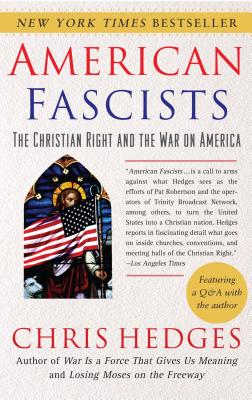 American Fascists: The Christian Right and the War on America
American Fascists: The Christian Right and the War on America
by Chris HedgesFree Press (Jan 08, 2008)
Read Detailed Book Description
Twenty-five years ago, when Pat Robertson and other radio and televangelists first spoke of the United States becoming a Christian nation that would build a global Christian empire, it was hard to take such hyperbolic rhetoric seriously. Today, such language no longer sounds like hyperbole but poses, instead, a very real threat to our freedom and our way of life. In American Fascists, Chris Hedges, veteran journalist and author of the National Book Award finalist War Is a Force That Gives Us Meaning, challenges the Christian Right’s religious legitimacy and argues that at its core it is a mass movement fueled by unbridled nationalism and a hatred for the open society.
Hedges, who grew up in rural parishes in upstate New York where his father was a Presbyterian pastor, attacks the movement as someone steeped in the Bible and Christian tradition. He points to the hundreds of senators and members of Congress who have earned between 80 and 100 percent approval ratings from the three most influential Christian Right advocacy groups as one of many signs that the movement is burrowing deep inside the American government to subvert it. The movement’s call to dismantle the wall between church and state and the intolerance it preaches against all who do not conform to its warped vision of a Christian America are pumped into tens of millions of American homes through Christian television and radio stations, as well as reinforced through the curriculum in Christian schools. The movement’s yearning for apocalyptic violence and its assault on dispassionate, intellectual inquiry are laying the foundation for a new, frightening America.
American Fascists, which includes interviews and coverage of events such as pro-life rallies and weeklong classes on conversion techniques, examines the movement’s origins, its driving motivations and its dark ideological underpinnings. Hedges argues that the movement currently resembles the young fascist movements in Italy and Germany in the 1920s and ’30s, movements that often masked the full extent of their drive for totalitarianism and were willing to make concessions until they achieved unrivaled power. The Christian Right, like these early fascist movements, does not openly call for dictatorship, nor does it use
physical violence to suppress opposition. In short, the movement is not yet revolutionary. But the ideological architecture of a Christian fascism is being cemented in place. The movement has roused its followers to a fever pitch of despair and fury. All it will take, Hedges writes, is one more national crisis on the order of September 11 for the Christian Right to make a concerted drive to destroy American democracy. The movement awaits a crisis. At that moment they will reveal themselves for what they truly are — the American heirs to fascism. Hedges issues a potent, impassioned warning. We face an imminent threat. His book reminds us of the dangers liberal, democratic societies face when they tolerate the intolerant.
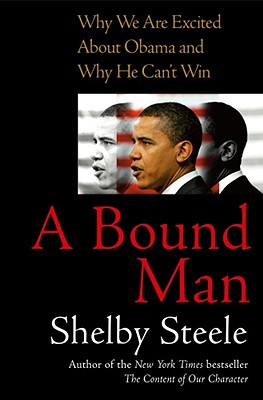 A Bound Man: Why We Are Excited About Obama And Why He Can’t Win
A Bound Man: Why We Are Excited About Obama And Why He Can’t Win
by Shelby SteeleFree Press (Dec 04, 2007)
Read Detailed Book Description
In Shelby Steele’s beautifully wrought and thoughtprovoking new book, A Bound Man, the award-winning and bestselling author of The Content of Our Character attests that Senator Barack Obama’s groundbreaking quest for the highest office in the land is fast becoming a galvanizing occasion beyond mere presidential politics, one that is forcing a national dialogue on the current state of race relations in America. Says Steele, poverty and inequality usually are the focus of such dialogues, but Obama’s bid for so high an office pushes the conversation to a more abstract level where race is a politics of guilt and innocence generated by our painful racial history — a kind of morality play between (and within) the races in which innocence is power and guilt is impotence.
Steele writes of how Obama is caught between the two classic postures that blacks have always used to make their way in the white American mainstream: bargaining and challenging. Bargainers strike a "bargain" with white America in which they say, I will not rub America’s ugly history of racism in your face if you will not hold my race against me. Challengers do the opposite of bargainers. They charge whites with inherent racism and then demand that they prove themselves innocent by supporting black-friendly policies like affirmative action and diversity.
Steele maintains that Senator Obama is too constrained by these elaborate politics to find his own true political voice. Obama has the temperament, intelligence, and background — an interracial family, a sterling education — to guide America beyond the exhausted racial politics that now prevail. And yet he is a Promethean figure, a bound man.
Says Steele, Americans are constrained by a racial correctness so totalitarian that we are afraid even to privately ask ourselves what we think about racial matters. Like Obama, most of us find it easier to program ourselves for correctness rather than risk knowing and expressing what we truly feel. Obama emerges as a kind of Everyman in whom we can see our own struggle to accept and honor what we honestly feel about race. In A Bound Man, Steele makes clear the precise constellation of forces that bind Senator Obama, and proposes a way for him to break these bonds and find his own voice.The courage to trust in one’s own careful judgment is the new racial progress, the "way out" from the forces that now bind us all.
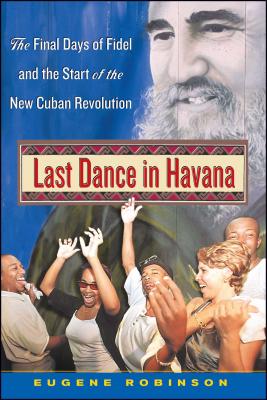 Last Dance in Havana
Last Dance in Havana
by Eugene RobinsonFree Press (Jun 27, 2007)
Read Detailed Book Description
In power for forty-four years and counting, Fidel Castro has done everything possible to define Cuba to the world and to itself — yet not even he has been able to control the thoughts and dreams of his people. Those thoughts and dreams are the basis for what may become a post-Castro Cuba. To more fully understand the future of America’s near neighbor, veteran reporter Eugene Robinson knew exactly where to look — or rather, to listen. In this provocative work, Robinson takes us on a sweaty, pulsating, and lyrical tour of a country on the verge of revolution, using its musicians as a window into its present and future.
Music is the mother’s milk of Cuban culture. Cubans express their fondest hopes, their frustrations, even their political dissent, through music. Most Americans think only of salsa and the Buena Vista Social Club when they think of the music of Cuba, yet those styles are but a piece of a broad musical spectrum. Just as the West learned more about China after the Cultural Revolution by watching From Mao to Mozart, so will readers discover the real Cuba — the living, breathing, dying, yet striving Cuba.
Cuban music is both wildly exuberant and achingly melancholy. A thick stew of African and European elements, it is astoundingly rich and influential to have come from such a tiny island. From rap stars who defy the government in their lyrics to violinists and pianists who attend the world’s last Soviet-style conservatory to international pop stars who could make millions abroad yet choose to stay and work for peanuts, Robinson introduces us to unforgettable characters who happily bring him into their homes and backstage discussions.
Despite Castro’s attempts to shut down nightclubs, obstruct artists, and subsidize only what he wants, the musicians and dancers of Cuba cannot stop, much less behave. Cubans move through their complicated lives the way they move on the dance floor, dashing and darting and spinning on a dime, seducing joy and fulfillment and next week’s supply of food out of a broken system. Then at night they take to the real dance floors and invent fantastic new steps. Last Dance in Havana is heartwrenching, yet ultimately as joyous and hopeful as a rocking club late on a Saturday night.
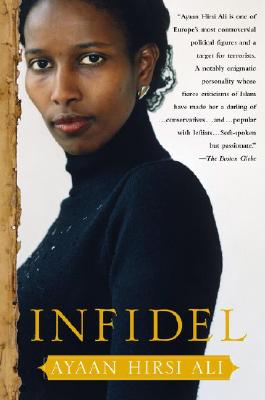 Infidel
Infidel
by Ayaan Hirsi AliFree Press (Feb 06, 2007)
Read Detailed Book Description
In this profoundly affecting memoir from the internationally renowned author of "The Caged Virgin, " Ayaan Hirsi Ali tells her astonishing life story, from her traditional Muslim childhood in Somalia, Saudi Arabia, and Kenya, to her intellectual awakening and activism in the Netherlands, and her current life under armed guard in the West.One of today’s most admired and controversial political figures, Ayaan Hirsi Ali burst into international headlines following an Islamist’s murder of her colleague, Theo van Gogh, with whom she made the movie "Submission.""Infidel" is the eagerly awaited story of the coming of age of this elegant, distinguished — and sometimes reviled — political superstar and champion of free speech. With a gimlet eye and measured, often ironic, voice, Hirsi Ali recounts the evolution of her beliefs, her ironclad will, and her extraordinary resolve to fight injustice done in the name of religion. Raised in a strict Muslim family and extended clan, Hirsi Ali survived civil war, female mutilation, brutal beatings, adolescence as a devout believer during the rise of the Muslim Brotherhood, and life in four troubled, unstable countries largely ruled by despots. In her early twenties, she escaped from a forced marriage and sought asylum in the Netherlands, where she earned a college degree in political science, tried to help her tragically depressed sister adjust to the West, and fought for the rights of Muslim immigrant women and the reform of Islam as a member of Parliament. Even though she is under constant threat — demonized by reactionary Islamists and politicians, disowned by her father, and expelled from her family and clan — she refuses to be silenced.Ultimately a celebration of triumph over adversity, Hirsi Ali’s story tells how a bright little girl evolved out of dutiful obedience to become an outspoken, pioneering freedom fighter. As Western governments struggle to balance democratic ideals with religious pressures, no story could be timelier or more significant.
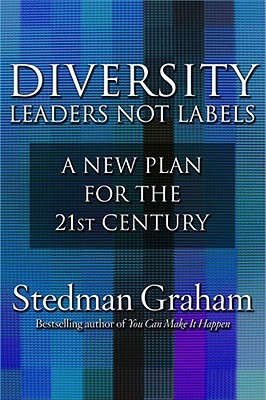 Diversity: Leaders Not Labels: A New Plan for a the 21st Century
Diversity: Leaders Not Labels: A New Plan for a the 21st Century
by Stedman GrahamFree Press (Sep 19, 2006)
Read Detailed Book Description
Stedman Graham, bestselling author of You Can Make It Happen, teaches that in the 21st century your talent and skills above all else will define your value. In Diversity: Leaders Not Labels, Graham shows you how to break out of the box that keeps you from growing to your full potential, and reveals that success is truly based on results, performance, and excellence. Diversity is literally changing the face of our nations. Workers of all backgrounds are merging into a global marketplace, while businesses are challenged by a shortage of talent and the need to integrate a wide range of cultures. In this global environment, diversity has become a permanent business characteristic; opportunities will be plentiful for both people and businesses. Graham indicates that we do not have to become a member of anyone else’s culture to play a key role, but must maintain and assert our own identities while respecting others’ uniqueness in our workforces and communities. He helps us to understand that developing leaders rather than accepting labels is ultimately the best way to preserve culture and create a legacy. Diversity: Leaders Not Labels studies diversity as no one has before, exploring different cultures and their histories to help you understand that everyone has had challenges and that the transformation process is the same for each of us. Hard work, sacrifice, talent, and self-motivation are the tools you need for the future. By showcasing individuals who have successfully transcended labels to become leaders, Graham helps readers begin to move from their history to carving their own individual pathways to success, based on authenticity as well as the talents and skill they bring to the workforce. "What is most important is breaking through labels and understanding who you are," says Graham. "Realize that everyone brings uniqueness, talents, and skills that add value to our experiences, work environments, businesses, and communities. When you operate from this perspective, you will emerge in the 21st century as a true leader to yourself, to others, and to society."
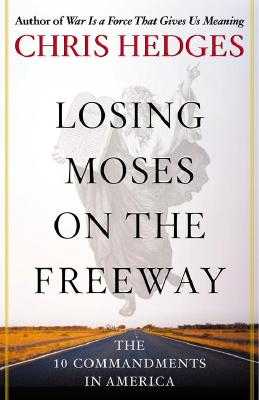 Losing Moses on the Freeway: The 10 Commandments in America
Losing Moses on the Freeway: The 10 Commandments in America
by Chris HedgesFree Press (May 31, 2005)
Read Detailed Book Description
In Losing Moses on the Freeway, Chris Hedges, veteran war correspondent and author of the bestselling War Is a Force That Gives Us Meaning, delivers an impassioned, eloquent call to heed the wisdom of the 10 Commandments. Celebrated for his courageous reporting on the crucial issues of our time, Hedges, who graduated from seminary at Harvard Divinity School, explores the challenge of living according to these moral precepts we have tried to follow, often unsuccessfully, for the past 6,000 years. The commandments, he writes, do not save us from evil. Instead they save us from committing evil.Inspired by unyielding faith, rigorous moral scrutiny, and a fierce sense of social responsibility, Hedges offers a breathtaking meditation on modern life. Losing Moses on the Freeway illustrates how the commandments usually choose us — and how we are rarely able to choose them. We cannot protect ourselves from theft, greed, adultery, or envy, nor from the impulses that lead us to commit evil acts. In honoring the commandments, we free ourselves from self-worship and are called back to the healing solidarity of community. It is in the self-sacrifice championed by the commandments that integrity, commitment, and, finally, love are made possible.
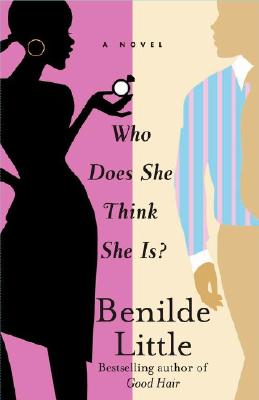 Who Does She Think She Is?: A Novel
Who Does She Think She Is?: A Novel
by Benilde LittleFree Press (Apr 26, 2005)
Read Detailed Book Description
Aisha Branch is in the midst of planning her elaborate wedding when the unthinkable happens — she falls for another man, hard. All the drama stirs up old feelings in her mother and grandmother, and as Aisha confronts a painful dilemma, the three Branch women take turns telling their own stories, reflecting separately on their lives and relationships. With her signature dry wit, quietly resonant insight and sharp yet compassionate eye, Benilde Little deftly explores one family’s expectations, anxieties and abiding love.
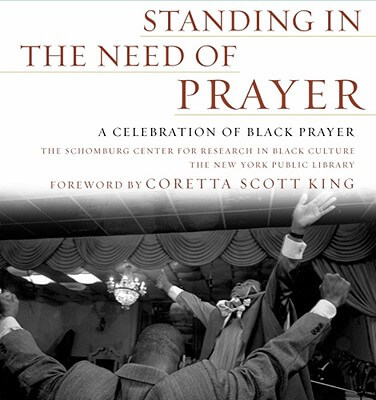 Standing in the Need of Prayer: A Celebration of Black Prayer
Standing in the Need of Prayer: A Celebration of Black Prayer
by Schomburg Center for Research in Black CultureFree Press (Nov 10, 2003)
Read Detailed Book Description
From the darkest days on slave ships to the defiant times of the Civil Rights Movement, prayer has embodied the most intense expression of African and African-American spirituality. As Mrs. Coretta Scott King writes in her foreword to Standing in the Need of Prayer, "It is said that every prayer is heard and every prayer is answered in some way [and] I still believe that the millions of prayers spoken by African Americans from the Middle Passage on down to today have been heard by a righteous and loving God."
In this remarkable book, striking photographs and powerful prayers drawn from the unparalleled collections of the Schomburg Center for Research in Black Culture span the broad spectrum of black religious traditions during the nineteenth, twentieth, and twenty-first centuries. From the plaintive Yoruba prayer to "Look after us,/Look after our children" and the humble opening prayer of the Qur’‚n to "Guide us on the right path" to W. E. B. Du Bois’s prideful prayer to "Let [Thy children] grow in the capacity for worthy work…and may they in the end prove worthy of their great heritage," this extraordinary volume reflects the struggle, despair, determination, and triumph of the black experience through the ages. Drawing from faiths as diverse as Islam, Christianity, Judaism, and Vodou, the book also includes prayers from some of history’s most powerful voices, among them Maya Angelou, James Baldwin, and Martin Luther King, Jr.
At once beautiful and evocative, Standing in the Need of Prayer captures the most varied, striking, and powerful photographic and poetic expressions of prayer in a joyous celebration of the rich spiritual roots of a courageous people whose incredible spiritual journey will inspire generations to come.
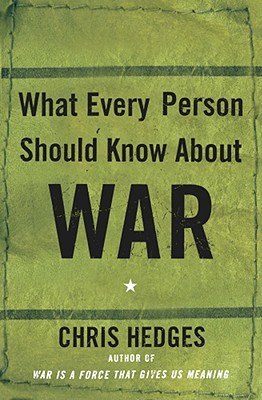 What Every Person Should Know About War
What Every Person Should Know About War
by Chris HedgesFree Press (Jun 09, 2003)
Read Detailed Book Description
Acclaimed New York Times journalist and author Chris Hedges offers a critical — and fascinating — lesson in the dangerous realities of our age: a stark look at the effects of war on combatants. Utterly lacking in rhetoric or dogma, this manual relies instead on bare fact, frank description, and a spare question-and-answer format. Hedges allows U.S. military documentation of the brutalizing physical and psychological consequences of combat to speak for itself.
Hedges poses dozens of questions that young soldiers might ask about combat, and then answers them by quoting from medical and psychological studies.
• What are my chances of being wounded or killed if we go to war?
• What does it feel like to get shot?
• What do artillery shells do to you?
• What is the most painful way to get wounded?
• Will I be afraid?
• What could happen to me in a nuclear attack?
• What does it feel like to kill someone?
• Can I withstand torture?
• What are the long-term consequences of combat stress?
• What will happen to my body after I die?
This profound and devastating portrayal of the horrors to which we subject our armed forces stands as a ringing indictment of the glorification of war and the concealment of its barbarity.
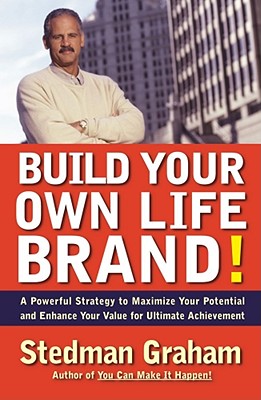 Build Your Own Life Brand!: A Powerful Strategy To Maximize Your Potential And Enhance Your Value For Ultimate Achievement
Build Your Own Life Brand!: A Powerful Strategy To Maximize Your Potential And Enhance Your Value For Ultimate Achievement
by Stedman GrahamFree Press (May 09, 2002)
Read Detailed Book Description
Let bestselling author Stedman Graham show you how building your own "Life Brand" will result in a more successful and fulfilling life.
From traditional corporations to the Internet, from top executives to people striving every day in their communities, "branding" has become one of the most significant marketing practices in pop culture today. We all rely on our favorite brand-name products to provide us with a certain level of quality. Now Stedman Graham shows readers how applying branding strategies to their own lives can help them attain their greatest potential and value.
We all have talents, knowldge, and other gifts to share — not just at work but with loved ones and everyone we meet. Putting these traits to work for you as part of your Life Brand will enable you to reach your highest goals and enrich the world around you. With entertaining and pointed insights on personal branding styles and step-by-step instructions for developing a brand of your own, Build Your Own Life Brand! will show you how to: Discover and develop your individual brand assets, like your talents, knowldege, and personal characteristics Build and expand upon those strengths Identify "target markets" for key areas of your life — your work your relationships, and your community Create more value in those markets as well as your own life.
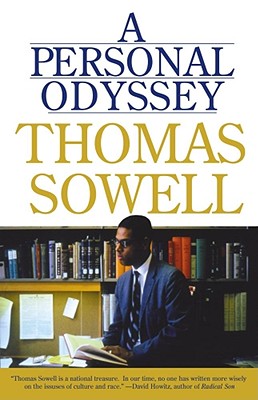 A Personal Odyssey
A Personal Odyssey
by Thomas SowellFree Press (Feb 05, 2002)
Read Detailed Book Description
This is the gritty story of one man’s lifelong education in the school of hard knocks, as his journey took him from Harlem to the Marines, the Ivy League, and a career as a controversial writer, teacher, and economist in government and private industry. It is also the story of the dramatically changing times in which this personal odyssey took place.
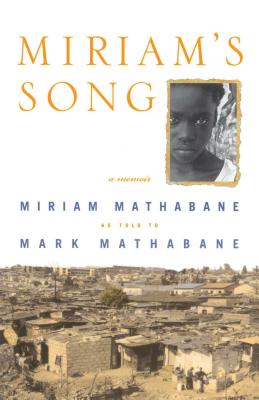 Miriam’s Song: A Memoir
Miriam’s Song: A Memoir
by Mark MathabaneFree Press (Jun 12, 2001)
Read Detailed Book Description
Mark Mathabane first came to prominence with the publication of Kaffir Boy, which became a New York Times bestseller. His story of growing up in South Africa was one of the most riveting accounts of life under apartheid. Mathabane’s newest book, Miriam’s Song, is the story of Mark’s sister, who was left behind in South Africa.
It is the gripping tale of a woman — representative of an entire generation — who came of age amid the violence and rebellion of the 1980s and finally saw the destruction of apartheid and the birth of a new, democratic South Africa.
Mathabane writes in Miriam’s voice based on stories she told him, but he has re-created her unforgettable experience as only someone who also lived through it could. The immediacy of the hardships that brother and sister endured — from daily school beatings to overwhelming poverty — is balanced by the beauty of their childhood observations and the true affection that they have for each other.
 This Side of Eternity
This Side of Eternity
by Rosalyn McMillanFree Press (May 01, 2001)
Read Detailed Book Description
From the bestselling author of Knowing, One Better, Blue Collar Blues and The Flip Side of Sin, comes this beautiful and evocative story of one family’s struggle for survival amid the hope and trauma of the civil rights movement in Tennessee. In what promises to be her most memorable work to date, bestselling author Rosalyn McMillan brings to life one of the most extraordinary chapters of American history, the civil rights movement. Rich in the tradition of Southern storytelling, This Side of Eternity is the story of an African-American family’s determination to stay together and survive any way they can in a world of discrimination and limited opportunity. With powerful, penetrating language and richly developed, characters, McMillan deftly weaves historical events into a compelling, unforgettable saga. When Anne Russell’s father is killed in an accident at his job in the late 1960s, her family must survive on its own through strikes, civil rights protests, and a racial tension that permeates every aspect of their daily lives. Struggling with the explosive social issues around her and the inertia of a family unwilling to help seize a better life, Anne begins to make it her own and embody the proud, indefatigable spirit of those around her who would succeed in changing the world.
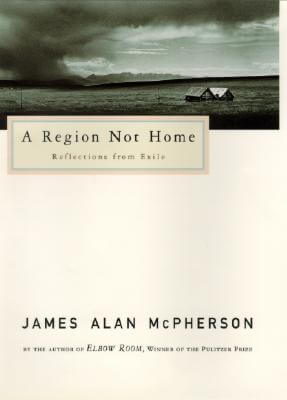 A Region Not Home: Reflections From Exile
A Region Not Home: Reflections From Exile
by James Alan McPhersonFree Press (Feb 06, 2001)
Read Detailed Book Description
In this deft collection of essays, Pulitzer Prize-winning author James McPherson offers poignant and lively interpretations of life that illuminate the ebb and flow of its sorrows and delights, and reveals his search for connections between everyday drudgery and a greater sense of purpose. He writes of the longing of the human soul by unifying thoughts of his deep affection for his daughter and the meaning of Disneyland; transcendental meanings in life and the tedium of long waits in airports, coming to self-knowledge and the cruel rituals of fraternity pledge week. A beautiful meditation on what it means to be human — an enlightening and soulful work reaching to the core of suffering and joy.
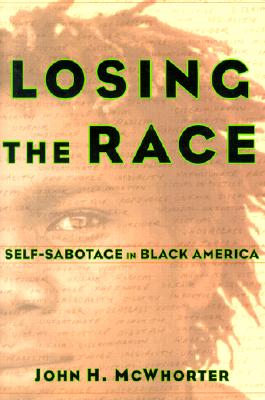 Losing The Race: Self-Sabotage In Black America
Losing The Race: Self-Sabotage In Black America
by John McWhorterFree Press (Aug 18, 2000)
Read Detailed Book Description
Is school a "white" thing? If not, then why do African-American students from comfortable middle-class backgrounds perform so badly in the classroom? What is it that prevents so many black college students in the humanities and social sciences from studying anything other than black subjects? Why do young black people, born decades after the heyday of the Civil Rights movement, see victimhood as the defining element of their existence? In this explosive book, Berkeley linguistics professor John McWhorter reports from the trenches of today’s college classroom to offer a daring assessment of what’s plaguing the children of yesterday’s affirmative-action babies. The Civil Rights revolution was the pinnacle of American history, freeing African Americans from centuries of disenfranchisement. Yet, as McWhorter shows, it has had a tragic side effect. As racism recedes as a serious obstacle to black advancement, most black American leaders and thinkers have been misled into a self-destructive ideological detour. Victimhood is exaggerated and enshrined more than constructively addressed. Following from this, young black people are shepherded into a separatist conception of "blackness" defined largely as that which is not "white." This in turn conditions a sense, embedded in black American culture as a whole, that academic achievement is a "white" realm that the "authentic" black person dwells in only for financial gain or to chronicle black victimhood and victories. McWhorter addresses these problems head-on, drawing on history, statistics, and his own life experiences. He shows that affirmative action in university admissions, indispensable 30 years ago, is today an obsolete policythat encourages the counterproductive ideologies of what he calls Separatism, Victimology, and Anti-intellectualism. Most perniciously, it prevents black students from demonstrating the abilities our Civil Rights leaders gave them the opportunity to nurture, and it deprives them of the incentive to strive for the very top. Racism is not dead — but as McWhorter so persuasively argues, dealing it a death blow will require a reinvestment in the strength that allowed black Americans to triumph and survive this far. His pathbreaking book is certain to shock, inspire, and ignite debate among all those who care about race and education today.
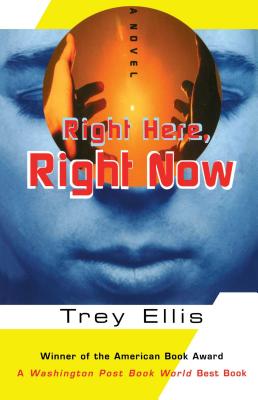 Right Here, Right Now: A Novel
Right Here, Right Now: A Novel
by Trey EllisFree Press (May 17, 2000)
Read Detailed Book Description
Through the Self-Help Glass Very Darkly
Meet Ashton Robinson, a dashing playboy whose suave charm, worldly pretensions, and ecstatic seminars have made him one of the most successful motivational speakers in the country.
After an encounter with the synergistic effects of marijuana and expired cough syrup, Robinson renounces his life as a self-help icon and pronounces himself a spiritually enlightened master. Overnight he invents the world’s newest religion, based on meditation, bungee-cord jumping, tantric sex, and The Gap. Has he stumbled upon one of the great truths of the universe? Or has the same outsized ego that fueled his success as a motivational speaker driven him over the edge?
With surgical wit and acuity, Trey Ellis has written a titillating and trenchant tale about the revivalist fervor of the American self-help industry. Right Here, Right Now is a corrosively funny and provocative exploration of the impulse to self-improvement one of the most salient features of American popular culture at the close of the twentieth century.
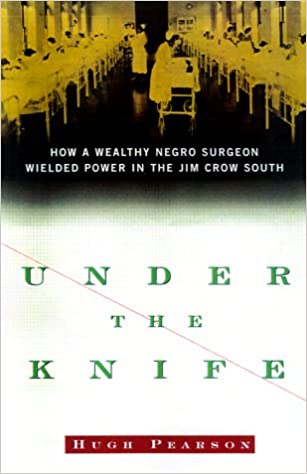 Under the Knife: How a Wealthy Negro Surgeon Wielded Power in the Jim Crow South
Under the Knife: How a Wealthy Negro Surgeon Wielded Power in the Jim Crow South
by Hugh PearsonFree Press (Feb 20, 2000)
Read Detailed Book Description
Just as he skillfully deconstructed the Black Panthers in his groundbreaking The Shadow of the Panther, Hugh Pearson presents in Under the Knife a familial tale of a different kind of black power that evades our most ingrained social clichés.
Pearson’s uncle, Dr. Joseph Griffin, lived in segregated Georgia and moved up the socioeconomic ladder by secretly performing abortions and treating the sexually transmitted diseases of the white folks in his community. When they couldn’t pay up, the good doctor extorted property deals from them! He also hired down-and-out blacks as butlers and chauffeurs and was a pillar in the Negro community (in a Robin Hood fashion). Pearson blends fact with rural fiction as he shows how African Americans in the era before the civil rights movement were sometimes able to outsmart the bigoted whites who, in a cosmic twist of fate, depended on them when the chips were down. —Eugene Holley Jr.
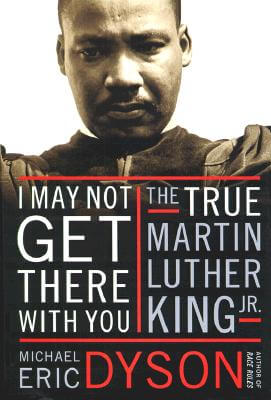 I May Not Get There with You: The True Martin Luther King, Jr.
I May Not Get There with You: The True Martin Luther King, Jr.
by Michael Eric DysonFree Press (Jan 17, 2000)
Read Detailed Book Description
Where is Martin Luther King, Jr. when we need him? So much has changed since the glory days of the civil rights movement — and so much has stayed the same. African Americans command their place at every level of society, from the lunch counter to the college campus to the corporate boardroom — yet the gap between the American middle class and the black poor is as wide as ever. Hollywood casts a black actor as president of the United States without provoking a word of protest, but a black man is savagely dragged to his death because of the color of his skin. The hip-hop culture that springs from the imaginations of urban black youth (who are themselves reviled and feared) sweeps across the malls and high schools of suburbia, yet black students still sit together, apart, in the cafeteria. Where can we turn to find the vision that will guide us through these strange and difficult times? Michael Eric Dyson helps us find the answer in our recent past, by resurrecting the "true" Martin Luther King, Jr. A private citizen who transformed the world around him, King was arguably the greatest American who ever lived. Yet, as Dyson so poignantly reveals, Martin Luther King, Jr. has disappeared in plain sight. Despite the federal holiday, the postage stamps, and the required reference in history textbooks, King’s vitality and complexity have faded from view. Young people do not learn how radical he was, liberals forget that he despaired of whites even as he loved them, and contemporary black leaders tend to ignore the powerful forces that shaped him — the black church, language, and sexuality — thereby obscuring his relevance to black youth and hip-hop culture. Instead, King’s legacyhas become a battlefield on which various forces wage war — whether it is conservatives who appropriate his words to combat affirmative action, or the King family themselves, who want to control use of the great man’s words for a fee. Former welfare dad, Princeton Ph.D., and Baptist preacher, Michael Eric Dyson sets out to find the man who was assassinated when Dyson himself was a nine-year-old boy living in downtown Detroit. And in his quest to unravel the meaning of King, Dyson discovers that the very contradictions embodied in the slain leader’s life make him a man for our times. He returns to us a man as radical in his view of social injustice as Malcolm X, who still won the support of the white establishment; a man dedicated to the common good, who gave in to his own appetites; a master of language and rhetoric, who "sampled" the words and ideas of others; a man who despised the unjust distribution of wealth and used its fruits to feed his own people. Dyson rescues from history a Martin Luther King, Jr. who matters "today: " a man who has as much in common with rap artist Tupac Shakur as he does with the Reverend Ralph Abernathy. Unafraid to confront King’s personal life, determined to defend King from the sanitizing forces of historical amnesia, Michael Eric Dyson challenges us to embrace the man who said, prophetically, on the eve of his death, "I May Not Get There With You," and to make him our partner in our ongoing struggle to get to the Promised Land.
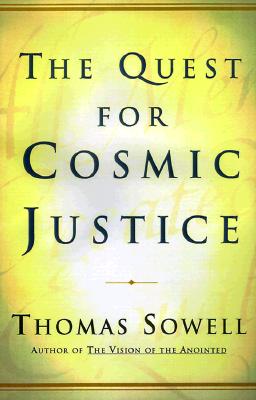 The Quest for Cosmic Justice
The Quest for Cosmic Justice
by Thomas SowellFree Press (Oct 11, 1999)
Read Detailed Book Description
This book is about the great moral issues underlying many of the headline-making political controversies of our times. It is not a comforting book but a book about disturbing and dangerous trends. "The Quest for Cosmic Justice" shows how confused conceptions of justice end up promoting injustice, how confused conceptions of equality end up promoting inequality, and how the tyranny of social visions prevents many people from confronting the actual consequences of their own beliefs and policies. Those consequences include the steady and dangerous erosion of fundamental principles of freedom — amounting to a quiet repeal of the American revolution. "The Quest for Cosmic Justice" is the summation of a lifetime of study and thought about where we as a society are headed — and why we need to change course before we do irretrievable damage.
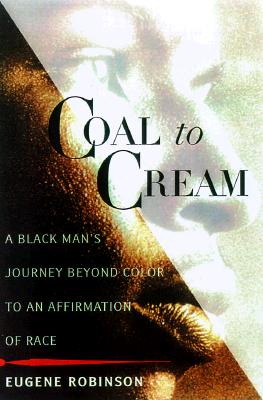 Coal to Cream: A Black Man’s Journey Beyond Color to an Affirmation of Race
Coal to Cream: A Black Man’s Journey Beyond Color to an Affirmation of Race
by Eugene RobinsonFree Press (Aug 13, 1999)
Read Detailed Book Description
A sojourn in Brazil teaches one of America’s leading black journalists that there is still strength—not weakness—to be found in racial identity.
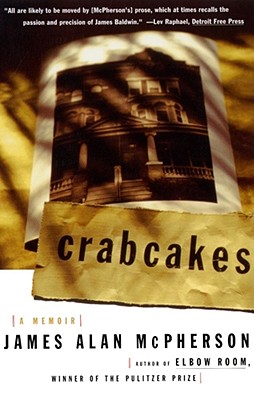 Crabcakes: A Memoir
Crabcakes: A Memoir
by James Alan McPhersonFree Press (Jan 27, 1999)
Read Detailed Book Description
With the same grace and lyrical precision that distinguish his vibrant short stories, James McPherson surveys the emotional upheaval of his last twenty-one years. From Baltimore, Maryland, to Cambridge, Massachusetts, to Iowa and Japan, Crabcakes witnesses McPherson’s confrontation with the past, and his struggle to make sense of it and to bind it, peacefully, to the present. His elliptical search for meaning — and his ultimate understanding of what makes us human — finds in Crabcakes a powerful and enduring voice.
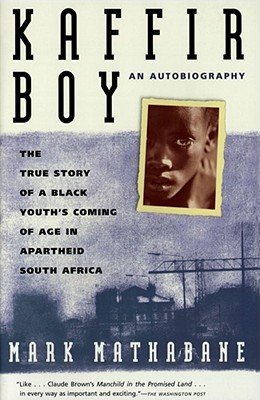 Kaffir Boy: The True Story of a Black Youths Coming of Age in Apartheid South Africa
Kaffir Boy: The True Story of a Black Youths Coming of Age in Apartheid South Africa
by Mark MathabaneFree Press (Oct 07, 1998)
Read Detailed Book Description
The classic story of life in Apartheid South Africa.
Mark Mathabane was weaned on devastating poverty and schooled in the cruel streets of South Africa’s most desperate ghetto, where bloody gang wars and midnight police raids were his rites of passage. Like every other child born in the hopelessness of apartheid, he learned to measure his life in days, not years. Yet Mark Mathabane, armed only with the courage of his family and a hard-won education, raised himself up from the squalor and humiliation to win a scholarship to an American university.
This extraordinary memoir of life under apartheid is a triumph of the human spirit over hatred and unspeakable degradation. For Mark Mathabane did what no physically and psychologically battered “Kaffir” from the rat-infested alleys of Alexandra was supposed to do — he escaped to tell about it.
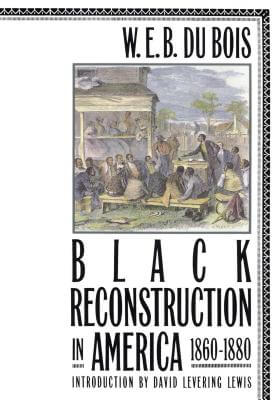 Black Reconstruction In America, 1860-1880
Black Reconstruction In America, 1860-1880
by W.E.B. Du BoisFree Press (Jan 01, 1998)
Read Detailed Book Description
Originally published in 1935, this pioneering work by the most influential Black intellectual of his time was the first full-length study of the role Black Americans played in the period after the Civil War, the period known as “Reconstruction.” During Reconstruction enslaved Black Americans were freed and an attempt was made to reconstruct American society.
Ignored at the time by mainstream scholars Black Reconstruction in America 1860–1880 is now recognized as a classic.
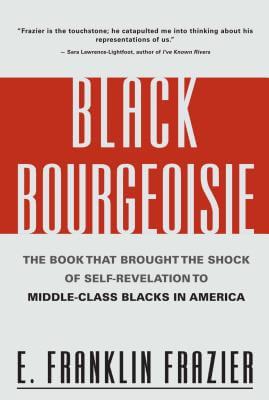 Black Bourgeoisie: The Book That Brought the Shock of Self-Revelation to Middle-Class Blacks in America
Black Bourgeoisie: The Book That Brought the Shock of Self-Revelation to Middle-Class Blacks in America
by E. Franklin FrazierFree Press (Feb 13, 1997)
Read Detailed Book Description
A classic analysis of the Black middle class studies its origin and development, accentuating its behavior, attitudes, and values during the 1940s and 1950s
Title: Black Bourgeoisie
Author: Frazier, Edward Franklin/ Wilson, William Julius (INT)
Simon & Schuster
1997/02/01
Number of 264
Binding Type: PAPERBACK
Library of Congress: 96029905
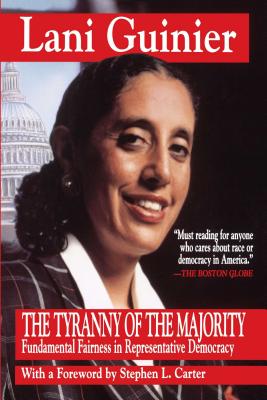 Tyranny of the Majority: Funamental Fairness in Representative Democracy
Tyranny of the Majority: Funamental Fairness in Representative Democracy
by Lani GuinierFree Press (Feb 01, 1995)
Read Detailed Book Description
"At last…the public hearing she was denied…These essays reveal keen powers of analysis applied to some of the most obdurate problems that bedevil electoral politics. Anyone who cares about the mechanisms of democracy should be engaged by her tough-minded explorations. It doesn’t matter where you think you stand: it’s all here, to argue or agree with."
— Henry Louis Gates, Jr.
"Lani Guinier’s fascinating book is a prophetic intervention into a public conversation we desperately need to rejuvenate. There is no doubt that her powerful voice will produce good consequences for our nation and world."
— Cornel West, "Author of "Race Matters"
"Intriguing and desperately needed…"
— "The San Francisco Chronicle"
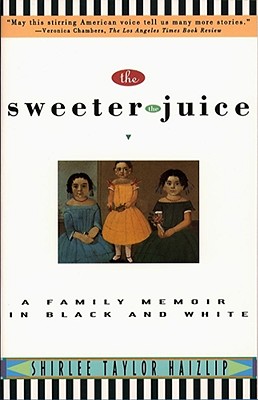 The Sweeter the Juice: A Family Memoir in Black and White
The Sweeter the Juice: A Family Memoir in Black and White
by Shirlee Taylor HaizlipFree Press (Jan 27, 1995)
Read Detailed Book Description
The Sweeter the Juice is a provocative memoir that goes to the heart of our American identity. Shirlee Taylor Haizlip, in an effort to reconcile the dissonance between her black persona and her undeniably multiracial heritage, started on a journey of discovery that took her over thousands of miles and hundreds of years. While searching for her mother’s family, Haizlip confronted the deeply intertwined but often suppressed tensions between race and skin color.
We are drawn in by the story of an African-American family. Some members chose to "cross over" and "pass" for white while others enjoyed a successful black life. Their stories weave a tale of tangled ancestry, mixed blood, and identity issues from the 17th century to the present. The Sweeter the Juice is a memoir, a social history, a biography, and an autobiography. Haizlip gives to us the quintessential American story, unveiling truths about race, about our society, and about the ways in which we all perceive and judge one another.
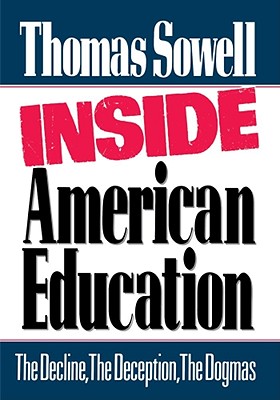 Inside American Education
Inside American Education
by Thomas SowellFree Press (Nov 02, 1992)
Read Detailed Book Description
An indictment of the American educational system criticizes the fact that the system has discarded the traditional goals of transmitting knowledge and fostering cognitive skills in favor of building self-esteem and promoting social harmony.
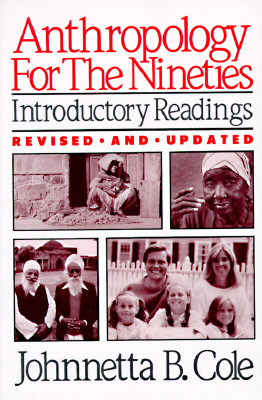 Anthropology for the Nineties: Introductory Readings (Revised and Updated)
Anthropology for the Nineties: Introductory Readings (Revised and Updated)
by Johnnetta Betsch ColeFree Press (Feb 01, 1988)
Read Detailed Book Description
Introductory Readings
Anthropology for the Eighties: Introductory Readings
by Johnnetta Betsch ColeFree Press (Jan 01, 1982)
Read Detailed Book Description
Introductory Readings
